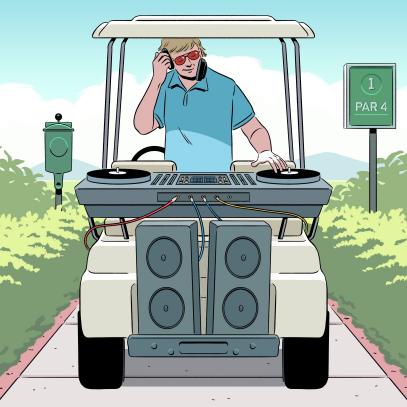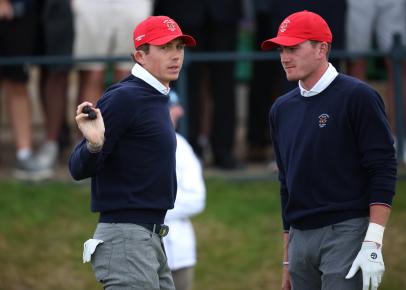Member's Tee
Course-management expert Scott Fawcett knows how we can all play smarter golf

Illustration by Chloe Zola
How many times have you finished a round and said, “I should have shot lower today”? As a mini-tour player, Scott Fawcett was tired of making strategic mistakes, so when Columbia Business School professor Mark Broadie helped develop the PGA Tour’s Strokes Gained statistics in 2011, Fawcett created a quantifiable course-management system called DECADE Golf. Fawcett works with numerous PGA Tour players, and DECADE is used by more than 100 college golf programs.
Fawcett joined us for the Golf Digest Happy Hour, our live webinar series with golf experts offered exclusively for Golf Digest+ members. This Q&A, selected from the one-hour interview, has been edited for clarity and concision.
Michael: For someone new to the game, what are the takeaways from what you teach?
Fawcett: The first selection off the tee should be driver. There needs to be a very good reason not to hit driver. For approach shots, on average, shading toward the middle of the green is a good idea. Now this is where it’s hard because aiming at the middle of the green is quite often less optimal than aiming at the flag. There’s an inflection point between aiming at the flag and at the middle of the green that is optimal.
Around the greens, just don’t miss the green with a chip. It’s stunning how many two-chips per round a 5-handicap or higher has. Then, on the green, get really good at speed control.
Charlie: How can you work on DECADE concepts in practice?
Fawcett: Start being aware of the width of your shot pattern. In other words, how far offline are your misses? That’s what I tell college coaches when they ask how their players should practice. I say use your launch monitor to illustrate to your players that everyone has a shot pattern, and this is why we need to play committed to our DECADE targets.
Luke: How does a tour player’s driver shot pattern compare to that of a 10-handicap?
Fawcett: For a tour player, the distance between their farthest left shot and farthest right shot that they typically hit in an event is 70 yards. The shot patterns are so much bigger than you would possibly imagine. It’s mind-boggling.
Think of shot patterns like a triangle. If you hit the ball the same number of degrees offline, but you hit it only 200 yards versus 300 yards, your shot pattern is going to be narrower. For 10-handicaps who hit it 200 yards, they can hit it much more offline [in terms of degrees] and still have the same 70-yard-wide shot pattern. A course doesn’t need that much more room for an average or poor player because even though the ball is going more crooked, it’s going shorter, so the shot pattern is quite often about the same width as tour players.
Todd: Is length more important than putting?
Fawcett: I wouldn’t say length, but I would say driving. There’s just no doubt, and this is a hard one for people to trust. In 2011, when they first started releasing the Strokes Gained/ putting data, I couldn’t wrap my head around an eight-foot putt having a 50/50 make percentage. I couldn’t believe that it was so low. I wrote a thread on an online poker forum that was titled “Is Drive for Show, Putt for Dough really true?” That’s one of the main topics 100 percent of golf-stats nerds agree on: The stats don’t support that cliché.
I don’t like the question of “Is distance more important than putting?” but I would say driving is definitely more important than putting. Again, it is based on the fact that nobody is very good at putting. That’s obviously a tongue-in-cheek joke, but it’s not too far from the truth. Relative to your handicap, you probably putt about average. Tee shots are how you can start taking huge chunks of expected value off a hole.


